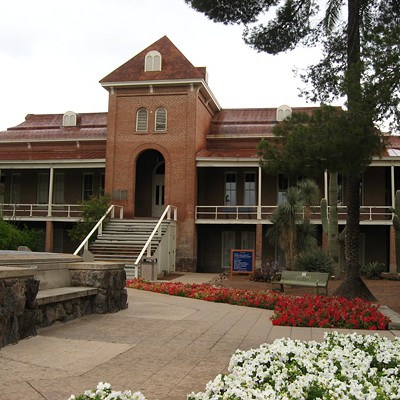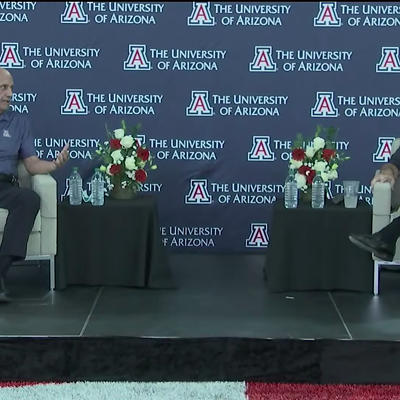The university is investigating the controversy, although officials seem reticent to call it an "investigation." Athletic Director Jim Livengood said he could not comment on anything specific regarding the Rodgers matter.
"There's a process for handling anything that comes in like that, and we take it very seriously," said Livengood. "You would be shocked at how many kinds of questions and e-mails we get. We get it all the time ... and we treat every one of them the same way."
However, most of those complaints probably don't involve half of an academic department coming forward and accusing a colleague and an athlete of conspiring in an act of possible academic fraud, as is the case here. Additionally, accusations are running amok that the issue may go beyond Rodgers and could include other student athletes. If these accusations, as yet unproven, were to be true, it could potentially mean serious problems for the UA and its athletic department.
Rodgers did not return an e-mail from the Weekly as of press time.
On March 28, eight tenure-stream faculty members in the Department of Classics sent a memo to Dr. Charles Tatum, the dean of the College of Humanities, regarding a vote of no-confidence in Dr. Alex Nava, an associate professor of religious studies who was the interim classics department head. (The Department of Religious Studies is currently part of the Department of Classics, even though they are two entirely different disciplines--and the fact that Tatum appointed a religious studies professor to be interim head of the classics department caused serious strain in the department, almost everyone agrees.) Nava has since stepped down as the interim department head, and several faculty members noted that the departments will soon be separated.
The memo accuses Nava of enrolling Rodgers--whose name is not specifically mentioned in the memo--in six units of graduate-level classics independent study, even though Rodgers, a graduate with a psychology degree, was not qualified to take the independent study. The memo also claims religious studies professor Nava was not qualified to administer the classics studies. (Although he had already graduated, according to NCAA rules, Rodgers was required to be enrolled in at least eight units worth of study.)
"Dr. Nava ... does not hold a joint appointment in classics, has no degree in classics, and did not seek the permission of classics faculty members, most notably the Curriculum Committee, to supervise this most unusual graduate level independent study in classics for six-units," the memo reads. "Dr. Nava further abused his power as interim head by enrolling the student-athlete in this course without submitting the necessary paperwork to the director of graduate studies in classics and then filing this paperwork in the department."
The memo also accuses Nava of "encourag(ing) and facilitat(ing) the same student-athlete's enrollment in a highly specialized (three-unit) graduate course in Greek and Roman Sculpture ... for which the student lacked the various prerequisites, and which the student has never attended this semester." The memo further alleges that unnamed witnesses overheard Nava on March 8 "imploring" the class' teacher not to drop Rodgers from the class while the UA basketball season was in session.
Five of the eight classics faculty members who signed the memo confirmed the memo's existence to the Tucson Weekly.
Nava, for his part, says he did nothing wrong, and says the memo was a result of an "intense division" between the religious studies and classics camps. He also said he believes an element of prejudice may be involved, since his independent studies work with athletes is being questioned while--he claimed--his work with non-athletes is not.
"It's a fact that my credibility is being questioned regarding my work primarily with black students," said Nava, who admits he's a big UA sports fan. "The reality is most of (the athletes) are African American. One of my areas of specialty is Latino, Latin-American and African-American culture and history. Most of my classes deal with those issues."
When asked about the petition's accusation that he's not qualified to lead an independent study in classics, Nava acknowledged "that's not my primary field, but I've taken Ph.D.-level classes on a variety of Greek texts." He also said his first book addressed classics in a small way.
He claimed everything was done legitimately regarding Rodgers, who, Nava says, was supposed to work on a major research paper on Greek tragedy.
"We talked about the subject matter orally and met on a couple of occasions," Nava said. "Then it was as simple as the fact that with all the crises (Rodgers) had personally and with the (basketball) program, he disappeared. I tried to get in touch with him--I called and went through his academic counselor."
The basketball "crisis" Nava refers to involves Rodgers' mid-January suspension from the team, by legendary UA coach Lute Olson, for conduct detrimental to the team. After missing eight games, Rodgers was reinstated to the team about a month later.
While he has not heard from Rodgers since, Nava said Rodgers could still come forward and complete his study.
"It's an important fact that the semester is not over."
Nava denied having anything to do with Rodgers' enrollment in Classics 554, the aforementioned Greek and Roman Sculpture class. He also denied "imploring" the class' teacher, Dr. Jeffrey Spier, to not drop Rodgers until after the season was finished, and instead said he was merely asking "how Chris was doing in the class."
To Nava's credit, Spier's recollection of the March 8 discussion was different than the version of events depicted on the memo, and seemed more in tune with Nava's recollection.
"I wasn't aware (Rodgers) was registered for the class," Spier said. "I think (Nava) was just asking if he was."
However, Spier did say he recalled that Nava asked if Rodgers could be dropped from the class. "He was asking me if I did that (dropped students mid-semester). I don't do that. ... It's not my responsibility to drop someone in the middle of the class. I don't do that until the end of the year.
David Christenson, an associate professor of classics, has a different take on whether Nava acted appropriately or not--and so do his colleagues who signed the no-confidence memo.
Christenson is the classics' director of graduate studies. He said he was doing a standard mid-semester review of the independent studies courses when he ran across the name Chris Rodgers, which he did not recognize as a classics graduate student. He was also surprised at the number of credits--six--being offered in independent study, rather than the usual three credits. Finally, he was surprised at the name of the professor, Nava.
When word got out about the Nava-Rodgers independent study relationship, a number of faculty members in the classics department fumed.
"This clearly was a misdeed," said Associate Professor of Classics Bella Vivante. "This was clearly a wrong action, an unethical action and an illegal action, according to university rules and NCAA rules."
Vivante and others also hinted that there is a history of odd arrangements in the religious studies program involving athletes. Robert Burns, the chair of the religious studies department--which only offers bachelor's degrees, whereas classics offers graduate degrees--commented that his department handles independent studies the same way as everybody else. When asked about accusations that religious studies offers independent study options to a lot of athletes, he said he didn't know much about the issue, and that "You'd have to talk to Dr. Nava about that," because Nava coordinates most of the department's independent study arrangements.
Nava said that this semester, he's handling approximately 27 independent studies students, and of those, 12 are athletes. He claimed that the disproportionately large number of athletes enrolled in independent study has to do with his ability to connect with minority athletes, as a Mexican American.
"I wanted to become a professor to make a difference in the lives of students," he said. "My connection is especially important with minority students. I will never ease up on that. It will always be a part of my career."
Meanwhile, definitive answers don't appear to be coming from higher-level UA officials anytime soon.
Dr. Charles Tatum, the dean of the College of the Humanities, said he could not comment on the matters involving Nava, Rodgers or the other independent study questions due to the confidentiality of personnel matters and the Family Educational Rights and Privacy Act. He referred the Weekly to Doug Woodard, the faculty athletics representative, who referred the Weekly to Rocky LaRose, the senior associate director of athletics, who--like Livengood, her supervisor--said she could not comment on the specifics of the situation.
And finally, Dana Thomas, the assistant coordinator of public and media relations for the NCAA, said the NCAA has a policy of not confirming or denying whether investigations or reports of possible wrongdoing exist--and referred the Weekly to the UA.













